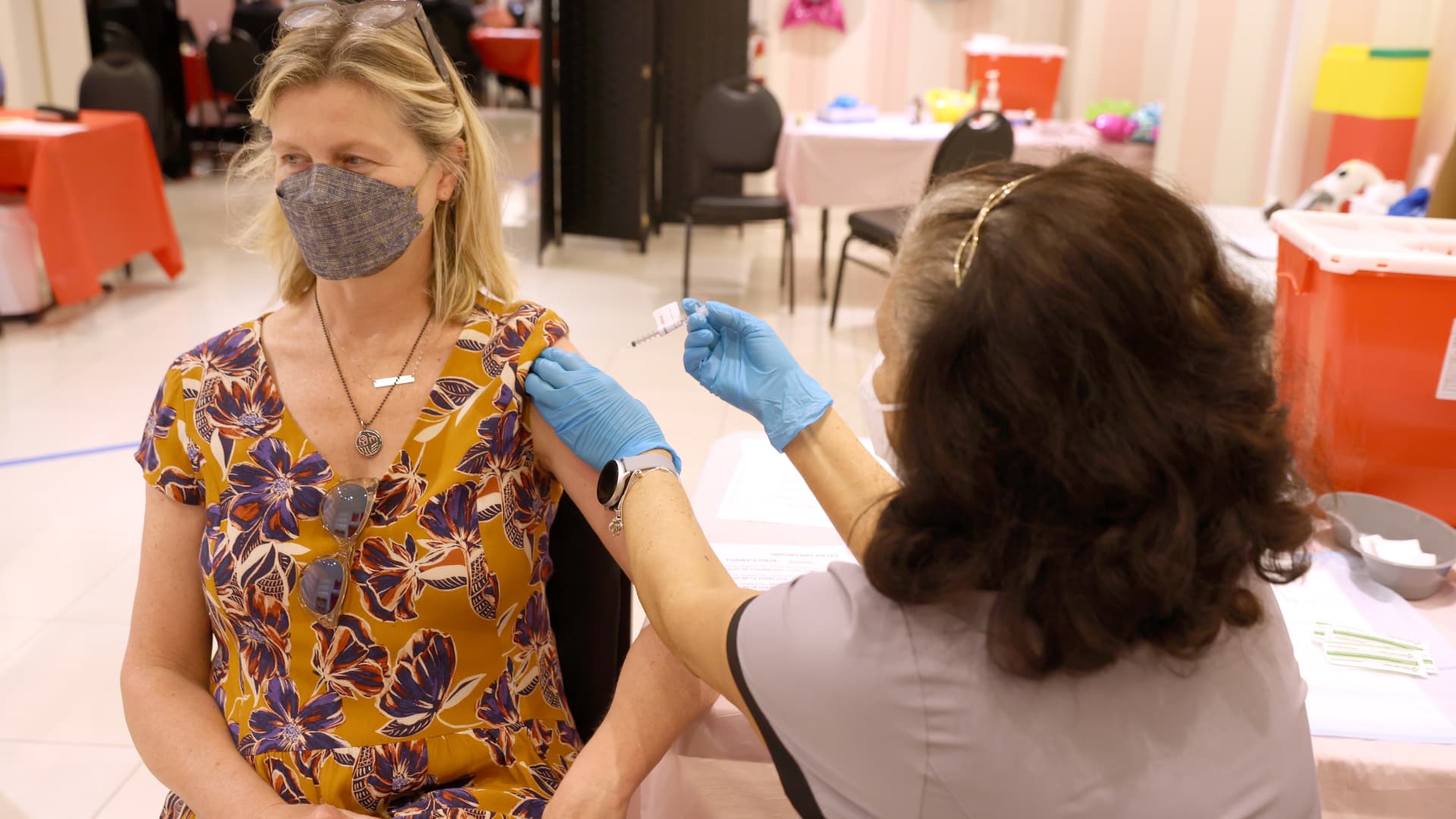
- New Covid vaccines from Pfizer, Moderna and Novavax will likely provide protection against the new "Eris" variant, now the dominant strain of the virus in the U.S.
- The drugmakers designed their updated coronavirus shots to target the omicron subvariant XBB.1.5, which is slowly declining nationwide.
- All three companies are still waiting for the Food and Drug Administration to approve their vaccines, meaning those jabs won't be available to the public for a month or so.
New Covid vaccines from Pfizer, Moderna and Novavax will likely provide protection against the new "Eris" variant, now the dominant strain of the virus in the U.S.
The drugmakers designed their updated vaccines to target the omicron subvariant XBB.1.5, which is slowly declining nationwide. But health experts and initial data suggest that the new shots will still be effective against Eris, or EG.5, and other widely circulating variants – all of which are descendants of omicron.
"I think that these vaccines will provide very substantial protection against EG.5. Maybe just a little bit of loss, but it's nothing that I'm very concerned about," Dr. Mark Mulligan, director of the NYU Langone Vaccine Center, told CNBC. "It looks like we're going to be OK."
All three companies are still waiting for the Food and Drug Administration to approve their vaccines, meaning those jabs won't be available to the public for a month or so. The Centers for Disease Control and Prevention also has to decide which Americans should get the shots and how often.
Still, the upcoming arrival of those vaccines offers some reassurance to Americans as Eris and other Covid variants fuel a slight uptick in cases and hospitalizations across the country but remain below the summer peak that strained hospitals this time last year.
Get Tri-state area news delivered to your inbox.> Sign up for NBC New York's News Headlines newsletter.
Eris accounted for 17.3% of all cases in the U.S. as of earlier this month, according to the latest data from the CDC. The new strain surpassed XBB.1.5, which accounted for roughly 10% of all cases.
Money Report
The World Health Organization earlier this month designated Eris a "variant of interest," meaning it will be monitored for mutations that could potentially make it more severe.
But the health agency and experts said Eris does not appear to pose a significant threat – or at least no more than any of the other omicron variants currently circulating in the U.S. It's also not expected to cause a huge wave of Covid cases like other strains have in previous years.
Why are the shots likely effective against Eris?
The new vaccines will likely provide protection against Eris because the strain has a very similar genetic makeup to XBB.1.5.
The key difference is that Eris carries an additional amino acid mutation, which may make the strain only slightly more capable of evading immunity from previous infection or vaccination.
"It's not like back then when we had the alpha, beta, delta and omicron variants emerge and they were significantly different from one another," said Dr. Nicole Iovine, chief hospital epidemiologist and an infectious disease physician at the University of Florida. "These are all omicron variants, so they're much more similar to each other. I think this vaccine is actually going to be quite effective because of that."

That's backed up by new data from the three companies.
Moderna on Thursday said its updated shot caused a "significant boost" in protective antibodies against Eris and another quickly spreading strain of the virus called "Fornax," or FL 1.5.1, in a clinical trial. The company didn't provide specific data on antibody levels since the trial results are preliminary.
But Moderna President Stephen Hoge said in a release that the results "reflect our updated vaccine's ability to address emerging Covid-19 threats."
A Pfizer spokesperson, in a statement to CNBC on Thursday, said the company's own shot "effectively neutralized" a number of omicron variants, including Eris and XBB.1.5, in a recent study on mice. The company plans on releasing the entirety of the study results in a research publication, the spokesperson said.
A Novavax spokesperson also told CNBC that it expects its updated Covid vaccine to work against Eris given its similarity to the XBB.1.5 strain.
"We're now conducting testing to demonstrate that," the spokesperson added.
Should you wait for the new shots?
As Eris gains a stronger foothold in the U.S., some Americans may be questioning whether they should get one of the currently available Covid boosters rather than waiting for the new shots to arrive.
Some experts say it depends on individual circumstances and risk levels, so patients should talk to their doctors.
Mulligan said unvaccinated or immunocompromised people who haven't gotten the available boosters could potentially consider taking them now. Those patients are at a higher risk of getting severely sick from Covid.
But he added that most people, especially healthy patients, could probably afford to wait for the new vaccines.
Eris isn't expected to infect a substantial number of Americans before the shots come out. "Some of us may get impacted, but I don't expect us to see a huge wave in a short period of time between now and the next month or two," Mulligan said.
The currently available boosters also might not provide as much protection against Eris because the variant has "drifted too far away" from omicron BA.5, according to Dr. Dean Blumberg, chief of the division of pediatric infectious diseases at UC Davis Health. The boosters target BA.5, BA.4 and the original strain of Covid.
"It's probably not going to be that beneficial and we do expect the updated vaccines to be available in about a month or so," Blumberg said. "So I would wait for that one and get one as soon as it's available."
Still, it's unclear how many Americans will take the new Covid shots given widespread vaccine fatigue.






